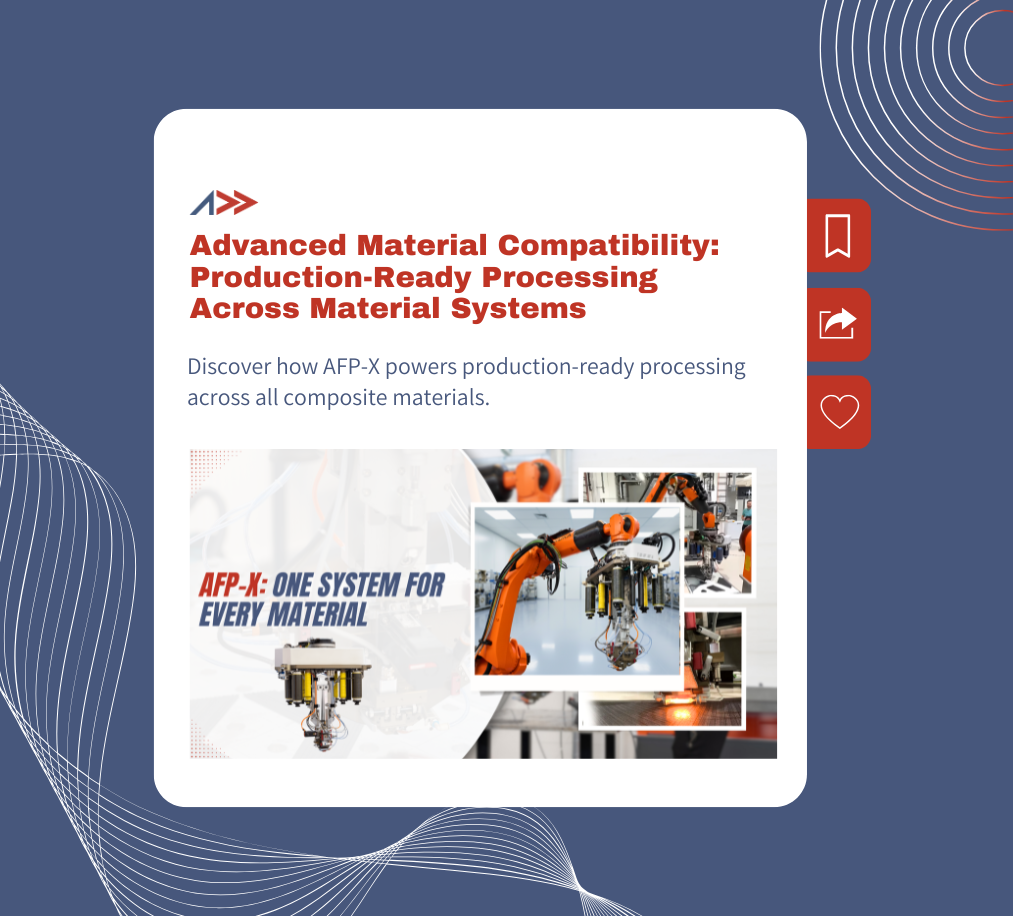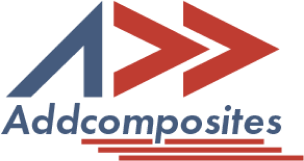


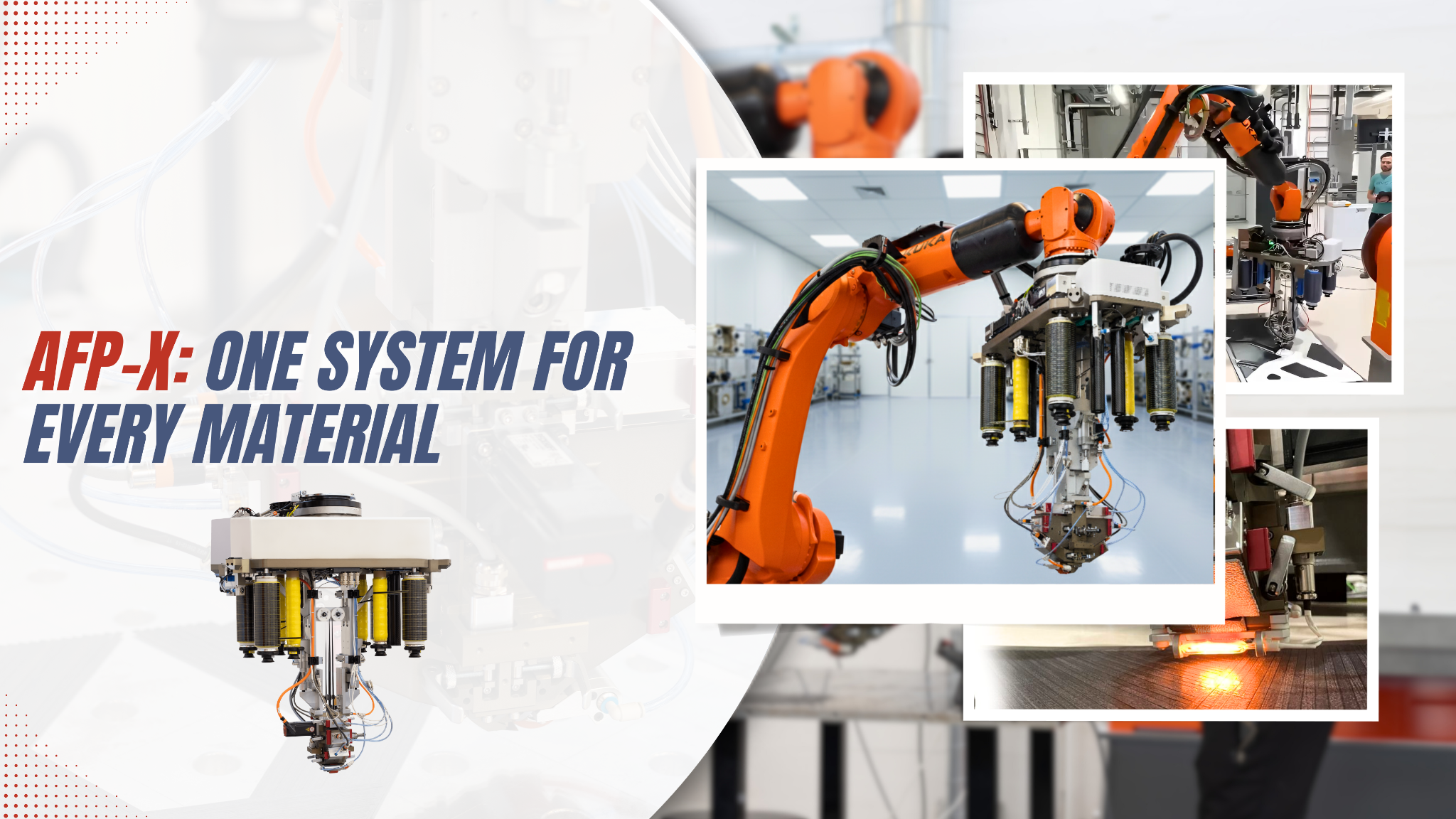
Deep dive into AFP-X's robust material processing capabilities for high-volume production environments - from thermosets to thermoplastics and dry fiber. Discover how the same versatility as AFP-XS is optimized for continuous, uninterrupted production runs.
1. The Foundation: Intelligent Material Management Architecture
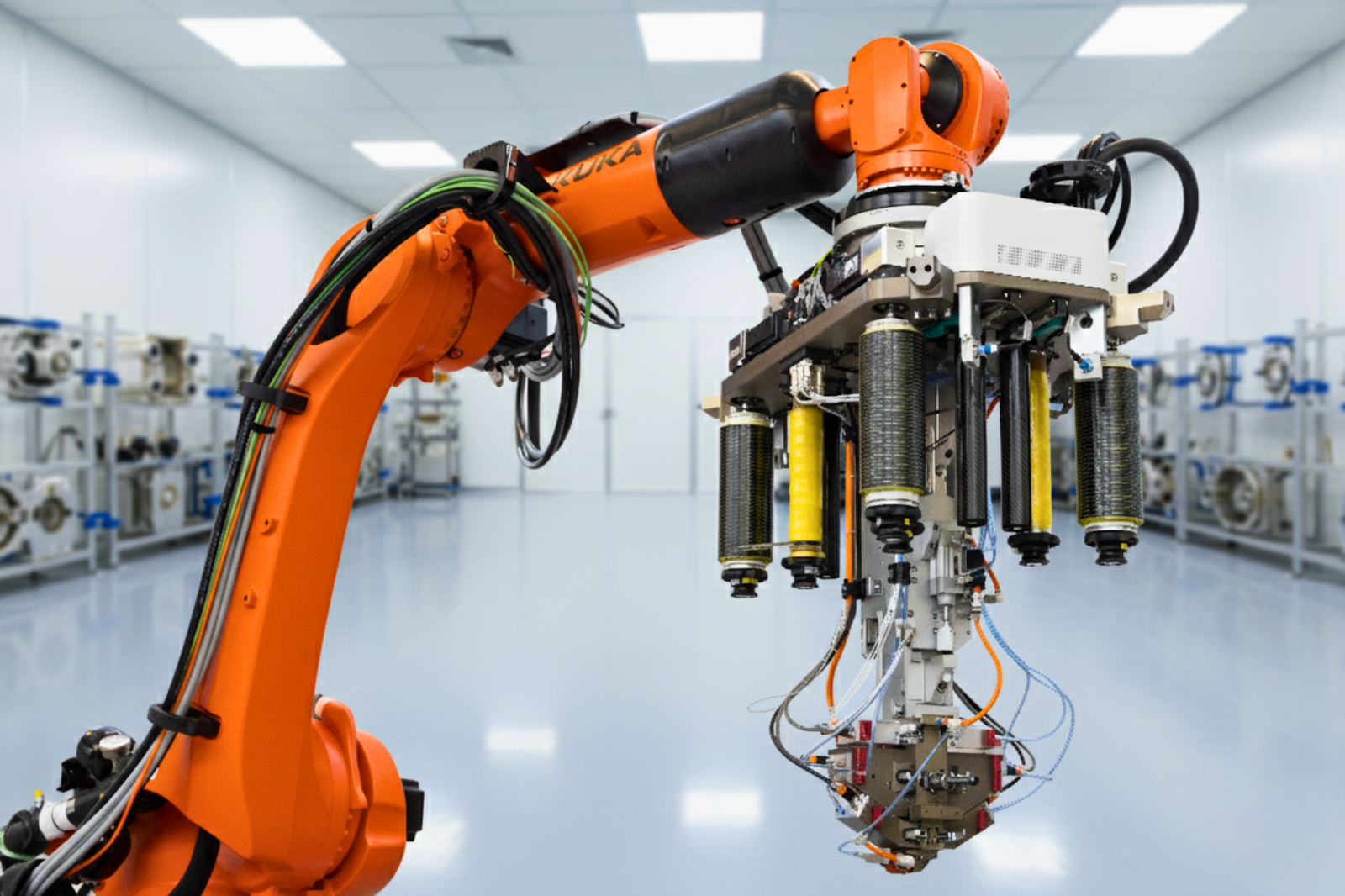
In the rapidly evolving landscape of automated fiber placement, manufacturers face a critical challenge: how to efficiently process multiple material types without sacrificing production speed or quality. The AFP-X system from Addcomposites represents a breakthrough in material versatility, offering seamless transitions between thermosets, thermoplastics, and dry fiber materials in true production environments.
At the heart of AFP-X's material handling capability lies an integrated storage and tensioning system. Unlike traditional AFP systems that require external material storage solutions, AFP-X incorporates material storage directly on the tool itself through its built-in creel system. This design philosophy enables operators to quickly swap between different material types with minimal downtime.
The system's architecture allows operators to park the robot in convenient positions for material changeover, facilitating swift transitions between thermoset prepregs, thermoplastic tapes, and dry fiber materials. While thermoset materials require additional handling due to their backing film, thermoplastic and dry fiber materials can be loaded relatively quickly, with only the tape material requiring guidance through the system.
The heating system adapts dynamically to material requirements - standard IR lamps suffice for thermosets, while high-temperature materials demand upgraded solutions like flash lamps, lasers, or hot air systems. This modular approach ensures optimal processing conditions for each material type without compromising system flexibility.

2. Thermoset Processing: Mastering Traditional Materials
For manufacturers working with thermoset prepregs, AFP-X delivers sophisticated control over critical processing parameters. The system manages the delicate balance of tack, drape, and out-time through precise thermal management.
Out-Time Management Excellence With modern thermoset materials offering up to 30 days of out-time, AFP-X operators maintain detailed log sheets tracking material exposure from the moment of removal from frozen storage. After accounting for thawing and transit time, operators typically work with approximately 28 days of viable material life. This systematic approach ensures materials are used within their working window, preventing quality issues from expired materials.
Precision Tack and Drape Control The system employs a sophisticated multi-zone thermal approach that optimizes material properties throughout the placement process. Materials remain relatively cool at the mounting point to prevent premature tackiness, while cooled guide chutes maintain non-stick properties during tape transport. At the critical moment of placement, IR heaters elevate tape temperature to 40-50°C, creating optimal tack for high-speed placement.
This temperature elevation serves a dual purpose - not only does it activate the resin's tackiness for secure placement, but it also enhances drapeability. The slightly elevated temperature creates a more flowable resin state, enabling the material to conform perfectly to complex geometries and maintain consistent quality even at production speeds.

3. Advanced Processing: Thermoplastics and Dry Fiber Excellence
Thermoplastic Processing - High-Temperature Precision Thermoplastic processing presents unique challenges, requiring processing temperatures of melting point plus 20-30°C for optimal consolidation. AFP-X addresses these demands through advanced thermal management systems that function like continuous thermoplastic welding.
The system integrates multiple heating technologies - flash lamp systems for rapid heating, laser heating for precise control, and hot air systems for specific applications. This is paired with active force compensation using closed-loop PID control to maintain consistent pressure distribution. The technology ensures uniform pressure application preventing air entrapment, consistent bonding quality across the entire layup, and real-time adjustment based on surface variations.
While complete in-situ consolidation remains an industry challenge (typically achieving 80-90% of hot-pressed strength), AFP-X maximizes achievable consolidation levels through its precise control systems, making it suitable for many production applications.
Dry Fiber Processing - Speed and Future-Ready Dry fiber materials represent the future of high-speed composite manufacturing, incorporating small amounts of thermoplastic binder in powder or stitch form. AFP-X excels in this domain, achieving remarkable placement speeds up to 1-2 meters per second.
The system's servo-based tension control with PID feedback maintains perfect fiber alignment, while flash or laser heating rapidly activates the minimal binder content. This combination enables AFP-X to meet the demanding production rates required by aerospace manufacturers transitioning to dry fiber technology. Environmental control systems maintain optimal humidity levels, preserving material integrity throughout the production process and ensuring consistent quality for subsequent resin infusion processes.
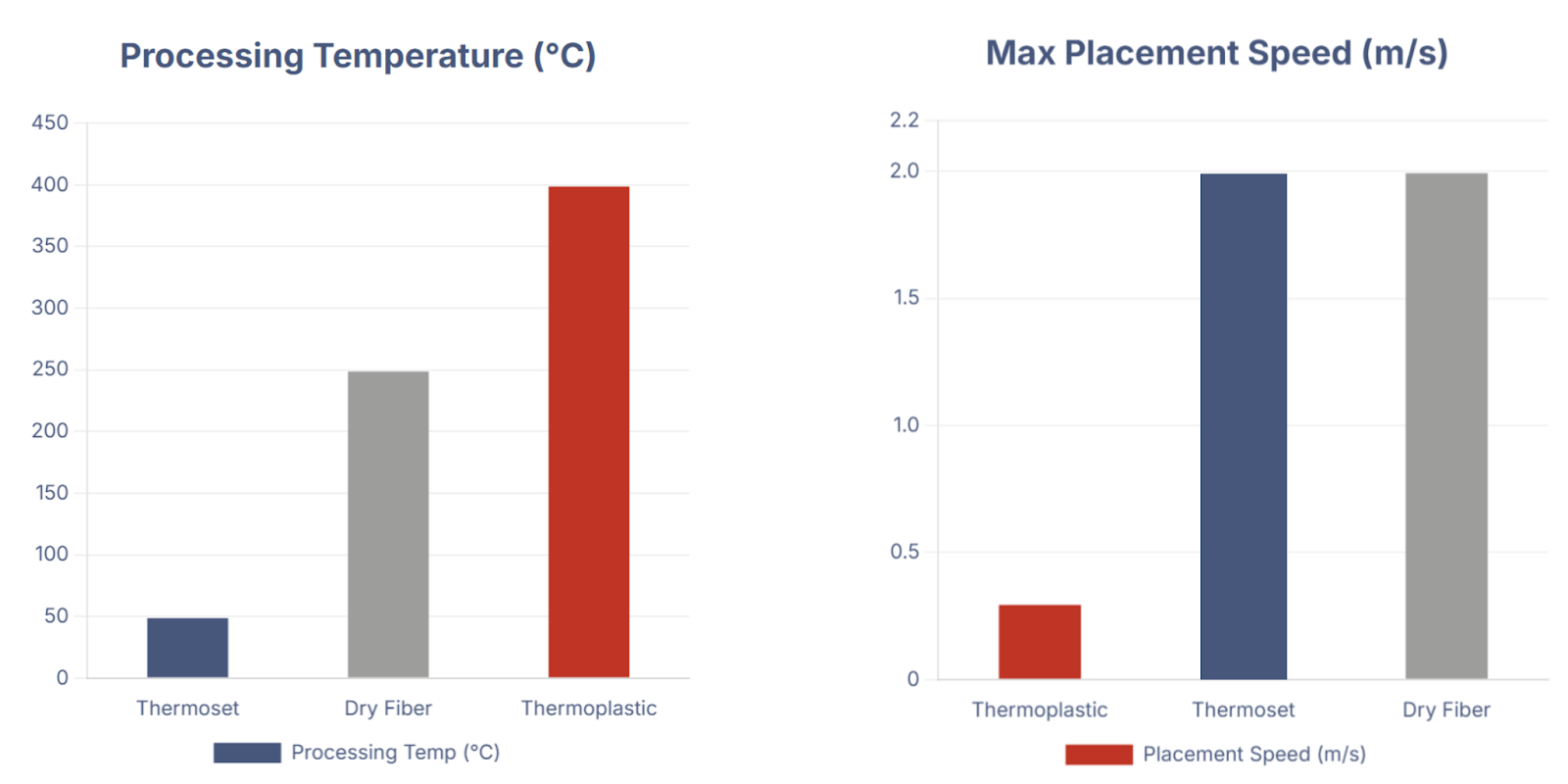
4. Digital Integration: AddPath Software and Quality Assurance
Central to AFP-X's material versatility is the AddPath software platform, serving as the digital backbone for comprehensive process management and quality control.
Intelligent Parameter Management AddPath enables operators to create comprehensive material libraries containing specific processing parameters for each material type. These profiles include temperature settings, placement speeds, compaction forces, and heating configurations. Different tool profiles can be saved for various heater configurations, ensuring consistent quality across operator changes and maintaining production standards through centralized parameter management.
Multi-Sensor Quality Assurance AFP-X incorporates an advanced sensor suite that streams real-time data to AddPath:
- Force sensors continuously monitor and maintain consistent compaction pressure
- Scan control systems detect and report gaps and overlaps with sub-millimeter precision
- Thermal cameras track cooling rates and identify potential defects in thermoplastic laminates
The software's digital twin functionality overlays actual production data onto planned laminates, providing real-time visualization of the entire layup process. This creates a comprehensive quality management system where operators can identify issues immediately and generate detailed quality reports for production validation. The 3D viewport visualization of scan point cloud data overlaid on planned laminates enables unprecedented process control and traceability.

5. Production Optimization: Economics and Efficiency
AFP-X's material versatility delivers significant economic benefits in high-volume production environments through intelligent design and operational efficiency.
Minimizing Changeover Impact While AFP-X doesn't incorporate automated scheduling algorithms, its design minimizes changeover impact through standardized procedures. A 5-10 minute end-of-shift cleaning cycle prevents cross-contamination between materials, ensuring no fiber or resin residue between material changes. The system accommodates different storage requirements seamlessly - cooling units for thermosets, dehumidified environments for thermoplastics and dry fiber - maintaining consistent material conditioning throughout the process.
Maximizing Resource Utilization The economic advantages are compelling:
- Material Efficiency: Near-net-shape manufacturing achieving approximately 99% material utilization
- Waste Reduction: Minimal material discard through consistent quality and precise placement
- Labor Optimization: Semi-automated operation requiring only supervisory oversight
- Equipment Utilization: Single tool processes all material types, maximizing ROI
The ability to process different materials with a single tool means higher equipment utilization rates, reduced capital investment in specialized equipment, and flexibility to respond to changing market demands. Whether producing small thermoset components or large dry fiber structures for infusion, AFP-X adapts to varying production requirements without compromising efficiency.
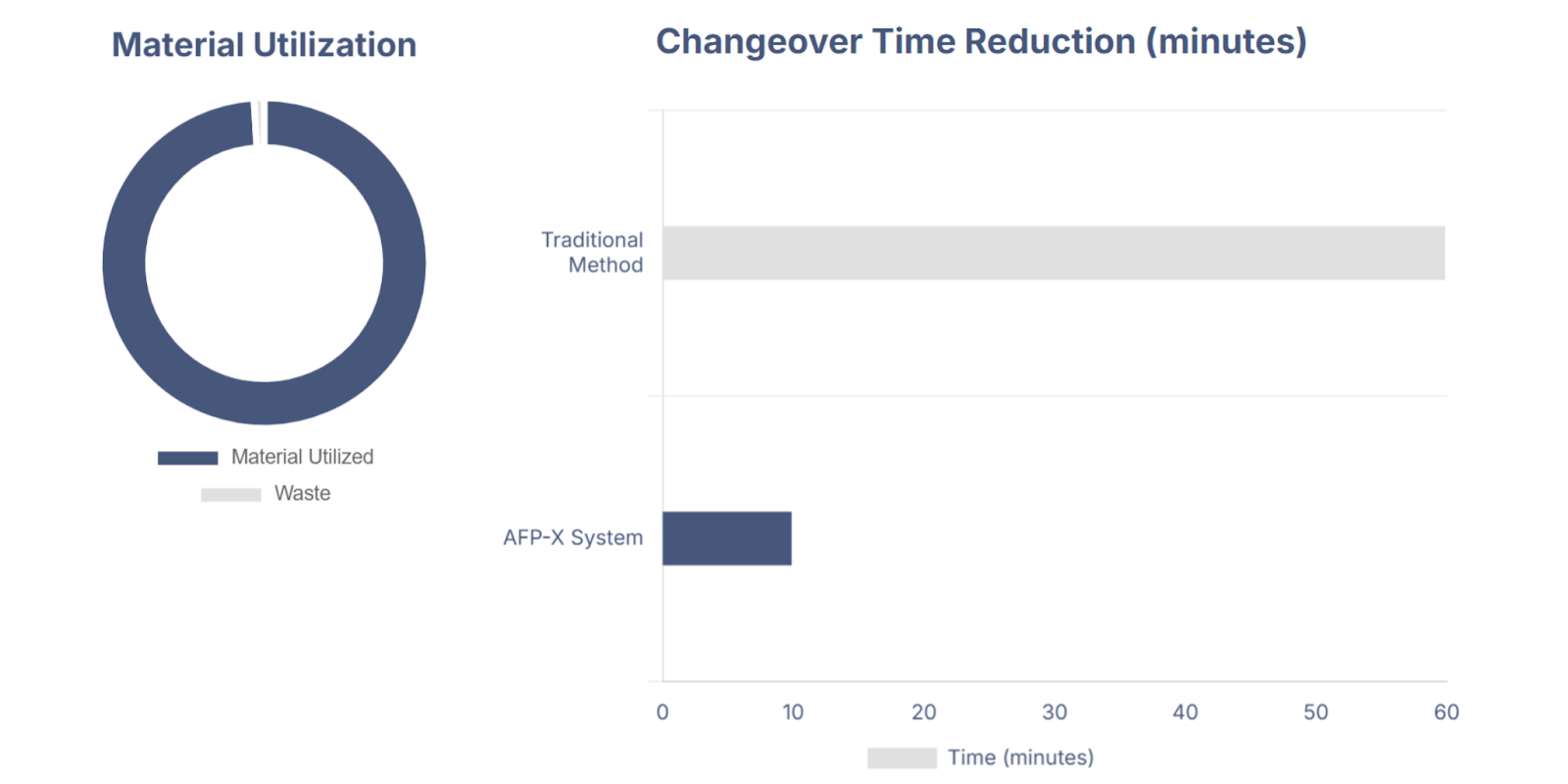
6. Transform Your Composite Manufacturing with Addcomposites
Ready to revolutionize your composite manufacturing? The AFP-X system brings unmatched material versatility to your production floor, processing thermosets, thermoplastics, and dry fiber with equal precision.
Why AFP-X?
- Single system for all material types
- Proven in high-volume production
- Complete digital integration via AddPath
- Industry-leading placement speeds up to 2m/s
Take Action Today: 📧 Contact our experts: sales@addcomposites.com
🌐 Explore AFP-X: www.addcomposites.com/all-products/afp-x
📞 Schedule a demo: Talk to our engineering team
Join leading manufacturers worldwide who've already transformed their production with AFP-X – where material versatility meets production excellence.


